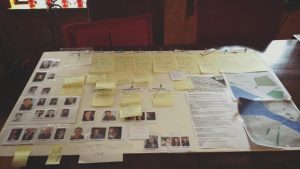I've been instructed to write a "spring themed flash fiction" for today's SFFSeven, and as we all know, flash fiction is my bane. However, instead, I dug up a long trunked project that will otherwise never see the light of day, and it's sort of got a spring theme. Spring is mentioned. Anyhow, it's the beginning (the first 500ish words) of something that didn't work, and it's rough as all get out, but: wouldn't flash be as well? It certainly would be from me.
Watch duty on the high towers of the Imperial Palace was something of a formality. None of the Imperial Guard minded doing the duty, as it involved little more than staying in the tower for a few hours. Most slept. Rumor had it that in the tenth century the paranoid Emperor Luciex VII had ordered that the guards watch from the towers at all time, and since the order had never been revoked, the towers were still watched seven centuries later. But there was never anything to see.
Never anything to see, that is, in the most classic sense of what one watches in a tower for—no invading armies, no trouble on the far horizon. Vedix, the capital of the Kieran Empire, had never actually had an enemy army approach it in the entire history of the Empire. And even if an enemy came, word would arrive long before they would be seen. But yet in the towers the Imperial Guard held watch at all times. As a formality.
This New Spring would be unique, or so the Emperor had been told, because on that night both moons would be full, and furthermore the Imperial Astronomers had told him that according to their calculations, on this night the Blood Moon (as they called the smaller red one) would eclipse the Ice Moon (the larger white one), creating a previously unseen spectacle in the Vedix sky. Such a sight was one to be seen, and therefore, the banquet. One in which anyone of any name at all in the Empire would wish to attend. The entire Imperial family, the Archdukes of the greater houses of the Empire, as well as the Nobles of the lesser houses of the Protectorates, the whole body of the Senate and Generals of the Imperial Army. This event was to be unprecedented. So the Emperor had ordered.
Today all the Imperial Guard was watching was large numbers of Kieran aristocracy coming into the palace and milling about. Tonight, by imperial order, was to be one of the greatest banquets ever known in Kieran history. This would be the one for the history books, the Emperor had decided, and so he had invited every person of note within the entirety of the Kieran Empire to attend. And by invite, he meant a command. Ignoring the invitation would be an act of political suicide.
People had been traveling for weeks to arrive in time for the event. The entire Imperial family, the Archdukes of the greater houses of the Empire, as well as the Nobles of the lesser houses of the Protectorates, the whole body of the Senate and Generals of the Imperial Army came at the request of Emperor Gelmin V.
While the festivities were hours away from officially beginning, several of the guests had already begun gathering in one of the gardens of the imperial palace. For them, it was a casual, relaxing time before the actual banquet, unaware of the busy rush of the palace staff to put all things in order.
Also, last month I appeared on Writing On The Air, and now you can listen to the podcast of that interview. Check it out!






